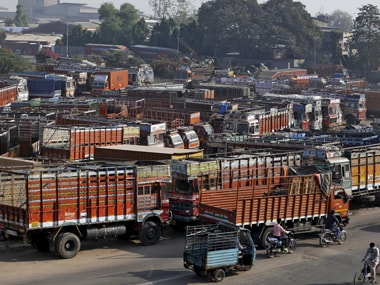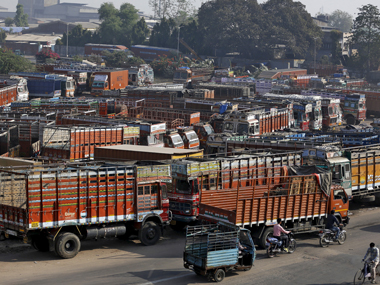Srinagar: Even as the Central government will herald the beginning of GST tax regime during a late night function at Central hall of parliament on 30 June, Jammu and Kashmir state will skip the deadline to roll out the indirect tax regime. In the wake of differences between PDP and BJP over its implementation and opposition by political parties including the Hurriyat Conference to the new tax law, there seems to be no indication of earlier implementation of GST in the state. “No we will n0t be able to meet the 1 July deadline to implement the GST. We however hope that the GST is implemented at the earliest in the state, but there are difficulties. We had to adjourn the assembly session since some political parties have opposed the GST implementation,’’ said Minister of State for Finance, Ajay Nanda. The BJP has been pressing on its coalition partner that the GST regime should be implemented at the earliest, but since the PDP is expecting that the new tax law will trigger an agitation its implementation has been deferred. Although government earlier said that a committee headed of different political parties will look into the extension of GST into the state, no orders have been issued to constitute it. The Hurriyat Conference has voiced its opposition to the GST law and has termed it as “ tantamount’’ to the weakening of state’s economy, while the different industry bodies have opposed it stating that this would erode the special status of the state. Both the National Conference and Congress have voiced their opposition to the GST law. NC has even charged the government of eroding the special status of the state and lack of any roadmap. [caption id=“attachment_2940664” align=“alignleft” width=“380”]  Representational image. Reuters[/caption] However, even as the state government has reiterated that it was for the first time that any constitutional amendment of Indian constitution was slated for debate in the legislative assembly, it fears that the pressing with the GST will trigger an agitation in Kashmir. The opposition to GST has come few days before the annual Amarnath pilgrimage is to begin from 29 June. The joint Hurriyat leadership of Syed Ali Geelani, Mirwaiz Umar Farooq and Yasin Malik raised concern over proposed implementation of GST in state and said that it is a “well thought out plan to cripple our trade and economy”. “They (Authorities) are hell-bent to harm business community. Few state ministers are in league with authorities in Nagpur and are being lured to implement GST in state,” they said in a joint statement. The state government has, however, said that it will be difficult for the businessmen to carry out trade with rest of the parts of India. “The businessmen and traders will face a difficult time and delay in implementation of GST will only harm the economy. We will also not get the compensation package from the Central government,’’ said Nanda. Law Minister, Abdul Haq Khan, said recently that through the discussion on the GST in the assembly the state government was reiterating the supremacy of the state legislature. He said it is ironic that the political parties that are today crying hoarse over the implementation of GST in J&K, facilitated extension of 46 constitutional amendments of the constitution of India to the state and under section-5 of the constitution of Jammu and Kashmir the state was free to levy any additional tax or new taxes. However constitutional expert and President of the High Court Bar Association (HCBA), Mian Qayoom, said that he sees the controversy over the GST being propped up to divert the issue from the resolution of Kashmir problem. “The GST is to divert the attention of the people of Jammu and Kashmir from seeking the implementation of United Nation Security Council resolutions which guarantees holding of plebiscite in the state of Jammu and Kashmir under the auspices of Security Council. It is to involve the people in controversies which will prolong the achievement of their cause. Otherwise also Parliament in view of constitutional application order 1954 read with constitutional application order of 1969, constitutional application order of 1972 and constitutional application order of 1985 has no power to make laws with regard to the imposition of taxes in the state of Jammu and Kashmir other than taxes on foreign travel by sea or air, inland air travel, postal articles including money orders, phonograms and telegrams.’’ As per constitutional experts the difficulty in extending the constitutional amendment 101 to the state of Jammu and Kashmir is due to the special status enjoyed by the state under Article 370, which specifies that either the consultation or the concurrence of the state was to be acquired before extending any central law through the order of the President to the state. The Article 370 specifies that the power of Parliament to make laws for the state of Jammu and Kashmir shall be limited to those matters in the Union List and the concurrent list which, in consultation with the government of the state, are declared by the President to correspond to matters specified in the Instrument of Accession governing the accession of the State to the Dominion of India. Besides laws can also be made with respect to other matters with the concurrence of the government of the state which the President may by order specify. Furthermore under section 5 of the constitution of Jammu and Kashmir, the “executive and legislative power of the state extends to all matters except those with respect to which Parliament has power to make laws for the state under the provisions of the constitution of India.’’ Chief spokesman of the BJP, Sunil Sethi, said “the state government will have to give concurrence to 101 amendment and it will go to the President who will issue the constitutional order and then it will be extended to the state.’’ “Earlier constitutional orders have been extended to the state by the concurrence of the governments. There are some who are stating that Article 370 has been eroded which is wrong as all previous constitutional orders have been extended under Article 370.’’ He, however, said that Article 370 was meant to be a temporary provision. He said that “ GST has to come to Jammu and Kashmir and there is no way out.’’
J&K state government has said that it will be difficult for the businessmen to carry out trade with rest of the parts of India
Advertisement
End of Article


)




